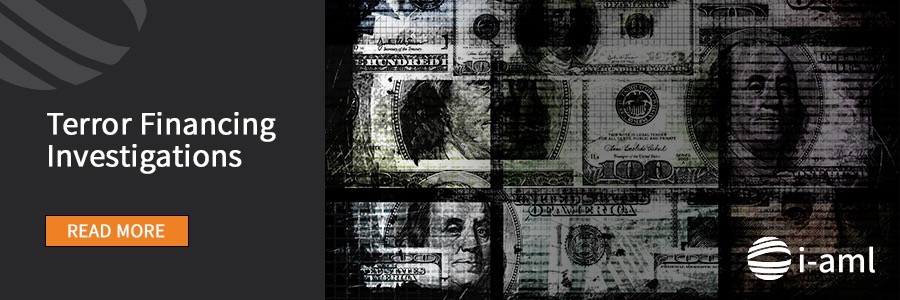This month there’s a focus on terrorist groups using organizations, including charities, to obscure their money trails. South Africa also published a report detailing terrorist financing risks within its non-profit sector.
Highlights include a foiled attack in the US connected to ISIL fundraising networks, a court case involving a Hay’at Tahrir al-Sham financier, and the criminal activities funding a separatist group in Bangladesh. Let’s get into it!
North America
An Idaho teenager was arrested for allegedly planning to attack churchgoers on behalf of ISIL. The FBI discovered his activities during an investigation into a fundraising network that uses cryptocurrency and other platforms to support affiliates of ISIL in Syria and ISIL-KP. The same investigation also revealed that an individual in Gaza was the ultimate recipient of funds collected by the network.
In Canada, Durham’s Deputy Chief of Police claims that there is a “strong possibility and belief” that car thefts in Ontario are financing terrorism, either directly or indirectly. Stolen cars are sent to Asia, Europe, Africa, the Middle East, and South America for resale.
Africa
New research from the Institute for Security Studies reveals that ISWAP (operating in Nigeria) recently increased taxes and imposed new fees. Fishermen using the ‘gura’ technique (Malian trap) now pay ₦50,000 (US$38) for a permit, a 67% increase from two years ago. The tax on a carton of processed fish has risen to ₦5,000 (US$4), and herders face a new cattle tax of ₦4,000 (US$3). These increased charges are contributing to community discontent and partly driving some ISWAP fighters to defect.
Two Jama’at Nusrat al-Islam wal-Muslimin (JNIM) leaders, one based in Mali and another in Burkina Faso, were sanctioned by the US Department of the Treasury for hostage-taking. This is a well-known method of raising funds for terrorist groups, although the actual profit that they make from this activity depends on who they kidnap, and how quickly they can secure a ransom.
Europe
A terrorism financing trial has begun for a British man accused of sending over $600 to his nephew, an alleged Hay’at Tahrir al-Sham militant through five payments issued in 2017 and 2018. The man reportedly used three Western Union transactions through a middleman in Turkey, and two additional transactions that were conducted through an unknown mechanism while the man was abroad.
The UK Government sanctioned an individual, Aozma Sultana, for allegedly providing funding to Gaza Now, a news agency accused of supporting Hamas and Palestinian Islamic Jihad. Sultana, the sole director of two UK-based companies, Aakhirah Limited, and Al-Qureshi Executives, reportedly collaborated with Gaza Now in fundraising efforts.
Italian authorities arrested a 32-year-old from Tajikistan who was wanted for terrorism-related crimes and suspected to have affiliation with ISIL. The police apprehended the man on a train to Rome while he was carrying two thousand euros in cash. Several other individuals from Tajikistan have recently been arrested for their alleged connection to supporting or financing the attack on the Crocus concert hall in Moscow.
French police arrested eight men suspected of financing the Kurdistan Workers Party (PKK). The arrests are part of an ongoing investigation into accusations that the individuals were involved in planning and financing terrorist acts and attempting to extort funds to support the PKK between 2020 and 2024. Investigators believe the suspects are connected to a fundraising campaign targeting Kurdish businesspeople in France. Funds raised were reportedly intended for use in Belgium, where police conducted raids on Kurdish-run media on April 22.
Middle East
A Tel Aviv court has rejected a plea to unfreeze the bank accounts of Israel’s Ra’am Party. The accounts were frozen by the Bank Leumi following allegations that Ra’ams fundraising charity, Igatha 48, had substantial links to Hamas.
The Israeli Defense Ministry and the Israel Defense Forces (IDF) transferred 29 million shekels (US$7.8 million), identified as terror funds collected in Gaza, to the Bank of Israel. The money supposedly came from Hamas strongholds and from the homes of ‘wanted individuals where there was terrorist activity’. The funds were acquired during the IDF’s ground operations and then ‘forfeited’ to the state.
A Lebanese man, previously sanctioned by the US Treasury in 2019 for allegedly channeling millions to Hamas, was found dead with gunshot wounds in a town outside Beirut. Identified as Mohammad Surur, he was involved in currency exchanges and money transfers, notably between the Quds Force and Hamas. Lebanese security forces concluded that Surur was likely the subject of a violent interrogation instead of an attempted theft. No particular individual, group, or government has been affiliated with the death.
The US Treasury designated two entities for running fundraising campaigns that collected $140,000 and $31,000 for two sanctioned individuals linked to violence in the West Bank. The Mount Hebron Fund raised $140,000 for Yinon Levi before the campaign was taken down and funds were frozen by a financial institution. Similarly, Shlom Asiraich raised $31,000 for David Chai Chasdai before their campaign was also removed from a crowdfunding site.
India, Pakistan, Bangladesh
Terrorists responsible for a recent café explosion in Rameswaram might be receiving cryptocurrency payments from international affiliates. The men are also said to have used fake IDs and used mostly cash payments while traveling to conduct their attack.
Nine individuals were charged under the Prevention of Money Laundering Act for supposedly collaborating with educational institutions to collect admission funds from students in Jammu and Kashmir who were attempting to enroll in courses at Pakistani institutes. The money was allegedly being used for terrorist activities in India.
Three recent bank robberies and a kidnapping in Bangladesh are believed to have helped finance the Kuki-Chin National Front, a militant group established with the aim to establish autonomy for the Kuki-Chin people along the Myanmar-Bangladesh border. Bangladeshi authorities also claim the Kuki-Chin National Front is receiving weapons from terrorist groups in neighboring countries.
Central and Southeast Asia
Journalists from a Russian opposition outlet discovered a cryptocurrency wallet on Telegram linked to the Tajik faction of ISIL-KP. Following the attack on the Crocus concert hall in Moscow, $2,525 was withdrawn from the wallet, and the detained suspects confirmed receiving the same amount on their cards. As the funds were withdrawn from the account immediately after the attack, the money could have been payment for the operation.
Oceana
The Philippines Department of Justice charged two individuals with allegedly financing terrorism and collecting funds for the insurgent group Communist Party of the Philippines-New People’s Army (CPP-NPA). In a different case, two human rights activists, Paul Tagle and Fritz Labiano, were charged after a July 2023 incident where they delivered groceries to political prisoners Rowena Dasig and Miguela Piniero. The Philippine Army alleges that this act amounted to financing terrorism. Another Philippines court sentenced an alleged Abu Sayyaf fund facilitator for receiving foreign funds and collaborating with another member to finance terrorist activities. Finally, the Anti-Money Laundering Council in the Philippines recovered over P50 million in funds (US $879,832.50), funds that a court found were associated with financing the Islamic State’s role in the 2017 Marawi City Siege. Indonesian police arrested 8 suspected militants believed to be part of a new cell linked to Jemaah Islamiyah. Police reported that all suspects actively participated in organization activities, particularly in military-style training and collecting funds for terrorist attacks.
May 9, 2024 Published by The Insight Threat Intelligence.







